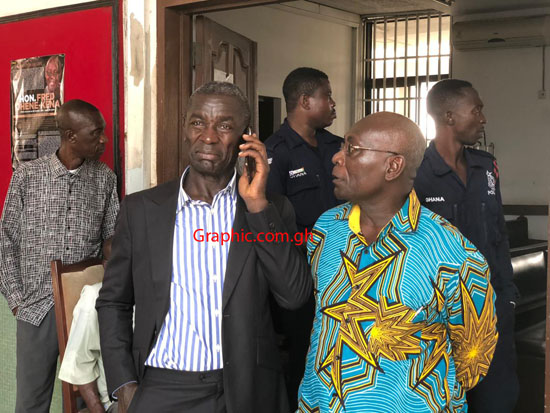
Prince Kofi Amoabeng and Michael Nyinaku charged with stealing
Prince Kofi Amoabeng and Michael Nyinaku, the founders of two collapsed banks, have been charged for allegedly stealing more than GH¢390 million and more than $8.6 million belonging to customers of their respective banks.
Amoabeng, the Founder of the defunct UT Bank, is accused of stealing about GH¢51.3 million and $8.6 million, while Nyinaku, the Founder of the defunct BEIGE Bank, is accused of stealing more than GH¢340 million.
The two appeared before the Accra Circuit Court yesterday on charges of stealing, contrary to Section 124 (1) of the Criminal Offences Act, 1960 (Act 29), and money laundering, contrary to Section 1(1) of the Anti-Money Laundering Act, 2008 (Act 749).
They pleaded not guilty to both charges levelled against them.
Case against Amoabeng
The prosecutor has accused Amoabeng of using the defunct UT Bank to invite people to invest with the bank, but failed to credit the investors’ accounts and rather transferred the money to UT Holdings, the parent company of the defunct bank.
![]()
“It was also revealed that Prince Kofi Amoabeng, the then Chief Executive Officer (CEO) of UT Bank, signed most of the customers’ investment certificates and subsequently transferred to UT Holdings,” the prosecutor, Assistant Superintendent of Police (ASP) Mr Emmanuel Nyamekye, told the court.
According to ASP Nyamekye, the said transaction was part of a report by the auditing firm, PricewaterhouseCoopers (PwC), which looked into “suspicious transactions” relating to the defunct bank.
The prosecutor made a case that GH¢51.33 million and $8.61 million were transferred from UT Bank to UT Holdings.
Read also:
Amoabeng breaks silence a year after collapse of UT Bank
GCB Bank lost GHȼ1bn in 4 months after absorbing UT, Capital banks
Exit pay of ex UT, Capital bank staff still unpaid
Case against Nyinaku
With regard to Nyinaku, the prosecutor claimed he allegedly stole GH¢340 million with the aid of eight others.
ASP Nyamekye explained that in 2017, the BEIGE Group acquired a 90 per cent stake in a savings and loans company known as First African Savings and Loans (FASL) for $2.5 million.
According to him, as part of the transaction, an account known as the FASL Operational Account was opened at the BEIGE Bank.
He said as of the time the BEIGE Bank went into receivership, the said account had about GH¢12 million in it, which was known to the leadership of FASL.
It is, however, the case of the prosecution that the BEIGE Bank secretly opened another account in the name of FASL, which it used to channel funds to its entities and cronies.
“The withdrawals from the false FASL account were at the behest of Michael Nyinaku,” he said.
The prosecutor further told the court that the said false FASL account had funds close to GH¢340.94 million when it was initially opened, but some of the money was later transferred.
ASP Nyamekye added that the leadership of FASL was not aware of the second account in its name.
He told the court that investigations into that particular case were ongoing to unravel many issues related to it.
Bail applications
In their respective responses, lawyers for the two accused persons denied the allegations levelled against their clients and urged the court to admit them to bail.
The lawyer for Amoabeng, Mr Addo Atuah, argued that the facts presented by the prosecution against his client were completely different from the true state of affairs.
He contended that whatever the actions or decisions taken by his client at UT Bank, they were legitimate banking transactions.
Counsel urged the court to admit his client to bail because he was presumed innocent, since he had denied the charges levelled against him.
It was also his argument that Amoabeng had several businesses in Ghana and a fixed place of abode and, therefore, he would not jump bail when granted bail.
“There is no evidence that he will not appear to stand trial. No sane person will abandon all these businesses that are thriving and flee the jurisdiction because of these allegations,” counsel argued.
Nyinaku’s lawyer, Baffour Gyewu Bonsu, urged the court to admit his client to bail because he was already on a police enquiry bail.
According to him, his client had never failed to honour any invitation by the police or other investigative bodies.
Counsel also argued that Nyinaku had a fixed place of abode and would always make himself available to answer the charges levelled against him and also aid the court to resolve all the issues related to the trial.
The prosecution did not oppose both applications for bail but urged the court to order the accused persons to deposit their passports and also report themselves to the police twice a week.
Amoabeng granted bail, Nyinaku remanded
In his separate rulings, Justice Emmanuel Essandoh, a High Court judge, with additional responsibility as a Circuit Court judge, admitted Amoabeng to bail but remanded Nyinaku into police custody.
He said lawyers for Nyinaku could apply for bail again at the next hearing.
He held that Mr Atuah’s argument for bail for his client was convincing, while Mr Bonsu could not convince him.
Justice Essandoh further held that there was no indication from the prosecution that Amoabeng’s case was still under investigation for him to be remanded to assist with investigations.
He, therefore, admitted Amoabeng to bail in the sum of GH¢110 million, with two sureties.
Per the bail condition, the sureties must be public servants who must not earn less than GH¢2,000 a month.
The accused must also deposit his passport at the court’s registry and report himself to the police every Monday and Friday.
Hearing continues on January 22, 2020.
